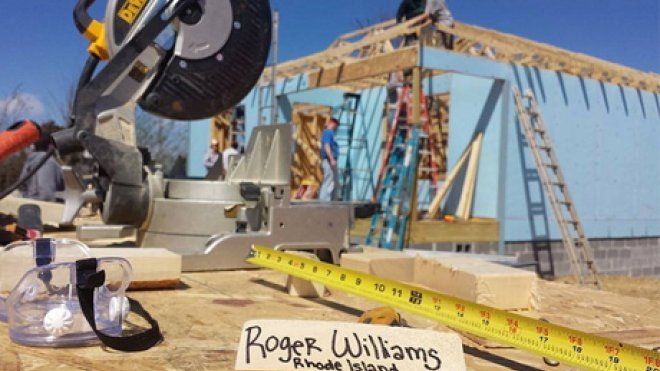On Spring Break, Trading Sun and Sand for Service Learning
From Providence to Pittsburgh to Peru, more than 130 students ditch beach towels and opt for tool belts this week as part of Alternative Spring Break projects

BRISTOL, R.I. -- For many college students, a week off in March means sunny, sandy Spring Break getaways -- but for a group of dedicated RWU and RWU Law students that seems to grow each year, the break from classes and assignments is an opportunity to give back, dive into outside-the-classroom learning experiences and have a little fun along the way.
This week, more than 130 students, from undergraduate to graduate to law, are participating in Alternative Spring Break trips, where groups of students -- often led by faculty or staff advisors -- work in teams to lead volunteer projects aimed at improving communities or assisting nonprofit organizations.
This year, students will serve local cities including Providence and Boston, travel across the country to New York City, New Orleans and Tuba City, Arizona, and even head abroad to countries including Peru, among others. Habitat for Humanity, Project Homecoming and Rebuilding Together are among the many partner organizations for which the students will volunteer to help address critical community issues from affordable housing to public health awareness.
In Dilley, Texas, a team of law students will work alongside Rhode Island immigration attorney Deborah Gonzalez '03, '07L to help a large number of immigrant children who are being held in detention centers as they await proceedings for their immigration cases. The RWU Law students will support pro bono attorneys by interviewing detainees and preparing packets for bond hearings, in addition to other research and support tasks. Other law school projects include public defender support (Bronx Defenders, Pittsburgh Federal Defenders), helping veterans with legal issues and housing (Connecticut Veteran's Law Center), and assisting women inmates with civil legal needs (Women in Prison Project).
Autumn Quezada-Grant, an RWU assistant professor of history, will lead the University's chapter of FIMRC (the Foundation for International Medical Relief for Children) to La Merced, Peru, to work on a rural medical campaign that provides basic medical care and public health awareness to underserved families. FIMRC CEO Meredith Mick selected RWU specifically for this newly established site in Peru, and it marks the first time the team will be in South America. The FIMRC chapter is also planning a trip to Nicaragua in May.
Anne Ryther, a senior biology major, has traveled to El Salvador, Nicaragua and the Dominican Republic with FIMRC and credits the experience with helping her determine her potential career path: “From my very first trip, I was moved by the people I met and families we helped, and it has inspired me to pursue this line of work. I know now that I want to continue work in this field, get a master's degree in public health and work for an organization like FIMRC.”
For the first time in the Alternative Spring Break program, students will be traveling to Tuba City, Arizona, a city located within Navajo Nation, a Native American-governed territory occupying parts of Arizona, Utah and New Mexico. The group will contribute to a variety of construction projects, volunteer in local classrooms and serve at the Angel House, which provides goods to local residents who are displaced due to storms, fire or other disasters. A significant component of the trip is to provide students the opportunity to experience the culture and history of the Navajo people by learning about land use, exploring basket weaving, visiting sheep camps and/or sampling traditional Navajo foods.
The Alternative Spring Break program continues to grow each year both in size of the student groups and scope of the service-learning projects. Ryther has seen the FIMRC chapter at RWU double since she’s joined and believes it's due to the eye-opening and inspirational experiences students have during their time on the trips, whether local or abroad.
“I am such a different person now compared to who I was before I began these trips," she added. "I believe that service-learning will be the new study abroad.”